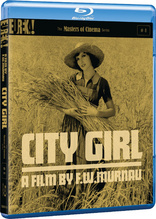City Girl Blu-ray Movie
HomeCity Girl Blu-ray Movie 
Masters of CinemaEureka Entertainment | 1930 | 90 min | Rated BBFC: PG | Feb 22, 2010
Movie rating
7.8 | / 10 |
Blu-ray rating
| Users | 4.5 | |
| Reviewer | 4.5 | |
| Overall | 4.5 |
Overview
City Girl (1930)
During a brief stay in Chicago, innocent farmer’s son Lem falls for and weds Kate, a hard-bitten but lonely waitress. Upon bringing her home at the start of harvest time, the honeymoon soon turns into a claustrophobic struggle as they contend with the bitter scorn of his father and the invasive, leering jealousy of the farm’s labouring community.
Starring: Charles Farrell (I), Mary Duncan, David Torrence, Edith Yorke, Guinn 'Big Boy' WilliamsDirector: F.W. Murnau
| Drama | Uncertain |
| Romance | Uncertain |
Specifications
Video
Video codec: MPEG-4 AVC
Video resolution: 1080p
Aspect ratio: 1.19:1
Original aspect ratio: 1.2:1
Audio
Music: DTS-HD Master Audio 5.1
Subtitles
None
Discs
25GB Blu-ray Disc
Single disc (1 BD)
Playback
Region free
Review
Rating summary
| Movie | 4.5 | |
| Video | 5.0 | |
| Audio | 4.0 | |
| Extras | 2.5 | |
| Overall | 4.5 |
City Girl Blu-ray Movie Review
F.W. Murnau’s often-overlooked pastoral gets a Blu-ray-only release.
Reviewed by Casey Broadwater February 26, 2010Among the German directors who emigrated to—or were poached by—Hollywood in the 1920s and 30s, F.W. Murnau is a tragic figure. Not only did he have a falling out with the studio system that Fritz Lang and Ernst Lubitsch eventually embraced and worked prolifically within, his genius was also abruptly extinguished when he died in an automobile accident shortly before the premiere of his final film, Tabu, in 1931. Best known for proto-horror nightmares like 1922’s Nosferatu and 1926’s Faust, Murnau was invited to Hollywood by studio head William Fox and made Sunrise, a cautionary romance about the perils of urban life that largely dropped the grotesqueries of German Expressionism while keeping the movement’s surreal dreaminess. With Sunrise, Murnau was granted unprecedented freedom by Fox, and the film was celebrated at the inaugural 1929 Academy Awards, winning in the short-lived “Best Picture, Unique and Artistic Production” category. Three additional films followed, though with each, Murnau’s working relationship with Fox deteriorated, mostly because the studio was feeling pressured to move away from silent films and invest in “talkies.” 4 Devils is notable for being one of the greatest of the lost silent classics—film historians to this day are scouring archives and private collections, hoping to find a print—and Tabu found the director leaving Hollywood to work in Bora Bora with early documentarian Robert Flaherty. Sandwiched between the two is City Girl, an underappreciated companion piece to Sunrise that serves up an unexpected thematic reversal. It’s also one of the most beautifully shot American pastorals ever.
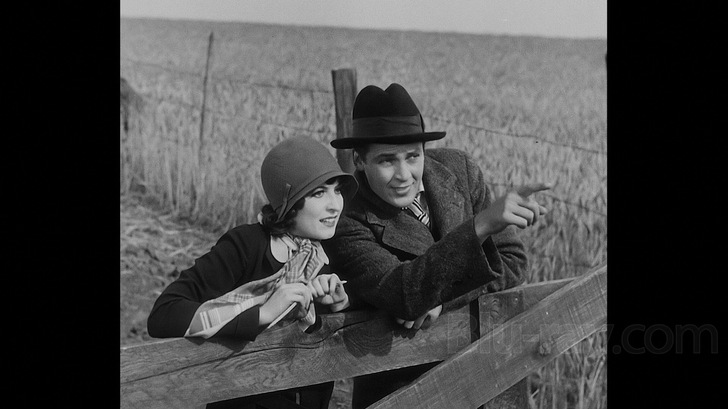
Lem and his City Girl...
To put City Girl in context, it helps to be familiar with Sunrise, in which a symbolic Woman from the City travels to the countryside on vacation, where she seduces a farmer and tries to convince him to drown his wife and move to the city. The idea, common in many Romantic-with-a-capital-R works, is that urban existence is dehumanizing and unnatural, and that city folk are intrinsically less moral than their rural counterparts. When City Girl begins, the attitude seems to be much the same. Lem (Charles Farrell) is a wet-behind-the-ears rube traveling to Chicago to sell his father’s wheat crop. And, of course, Chicago is no place for a naïve, impossibly earnest country boy. On the bidding floor, we see a teeming mass of speculators, buying and selling according to the rapidly fluctuating grain prices. Later, out on the street, Lem is literally lost in the crowd as Murnau’s camera pulls back and—in a brilliantly disorienting moment—purposefully loses sight of him. The diner where Lem goes for lunch is also chaotic, so packed that whenever a seat at the counter is vacated, it’s immediately filled by the next breathless patron. It’s here that Lem meets and falls for Kate (Mary Duncan), a waitress who dreams of an idyllic life outside the big city. Kate’s world is a cruelly artificial parody of nature. At the diner, where catcallers ogle her legs, an electric fan stands in for the country breeze. In her ramshackle apartment, the only sign of life is a brittle, dust-covered plant, and a billboard for placid Lake Minnetonka hangs on the other side of the train tracks, a paradise lost. Even the birdcage that sits on her table is a farce; it houses a mechanical bird that only chirps when it’s wound up.
So, when Lem asks Kate to marry him and whisks her off to the country, where they laugh and play in a rolling field of waist-high wheat, we’re led to feel that this return to the natural world is somehow inherently right. But then reality sets in, and the newlyweds' honeymoon is cut drastically short. Lem has undersold his father’s crop for a loss of over $700, and the penny- pinching, tight-fisted old Bible-thumper—played with wild-eyebrowed intensity by Scottish actor David Torrence—sees Kate as a corrupting, immoral influence, the cause of all the family’s recent ills. She’s quickly reduced to a servant, busing the dinner table and doling out lunch for the itinerant workers who have come to harvest the wheat. Essentially, nothing has changed for her. If anything, life is much worse. She gets slapped around by her father-in-law, her namby-pamby husband refuses to stand up for her, and the yokel farmhands—led by a brute named Mac (Richard Alexander)—drool over her physique with more obvious lust than the lunchtime city businessmen ever mustered. So much for the myth of country folk as peaceful, noble, and pure of heart. When Mac makes a pass at Kate, offering to help her get revenge on her father-in-law if she’ll run away with him, the narrative takes a literally dark and stormy turn, rumbling with mistrust and misunderstandings. If the film has one fault, though, it’s that the dénouement is much too tidily resolved, the final beats wrangled into a Hollywood happy ending that seems forced and emotionally false.
That said, there’s really no knowing what Murnau’s intentions for the final film would have been, as he left City Girl somewhat abruptly to be edited and inter-titled by his dialogue writers, H.H. Caldwell and Katherine Hilliker. Later, the studio even bastardized the plot and ordered re- shoots in an attempt to turn the film into a partial “talkie,” but this sound version has since been lost. Regardless as to where Murnau’s artistic freedom ended and studio intervention began, however, City Girl is a brilliant example of the silent film medium at its zenith, and in many ways it even stands toe-to-toe with Sunrise, which is widely considered one of the greatest films ever made. (In 2002, Sunrise was in the top ten of Sight and Sound’s critic’s poll.) The two films certainly complement one another—although they’re almost polar opposites thematically—and both are must-see experiences for anyone with an appreciation for silent film. Where City Girl stands out, almost tragically, is how it shows the soon-to-be-departed Murnau evolving into an ever more realistic mode of filmmaking, less dependant on the stagy mise en scène of Expressionism—as glorious as those twisted, perspective-warping sets were—and more in tune with the brisk rhythms of life. The scene of Lem and Kate running through the wheat field together, for example, is one of the most joyously alive sequences ever put to celluloid. It’s tempting to wonder what direction his career would’ve taken had he, like Lang and Lubitsch, continued to make films into the middle of the 20th century, but it’s perhaps more fulfilling to recognize the great influence that he had on later generations of filmmakers, most specifically, on Terrance Malick and Days of Heaven, which is enormously indebted to City Girl's bucolic splendor.
City Girl Blu-ray Movie, Video Quality 
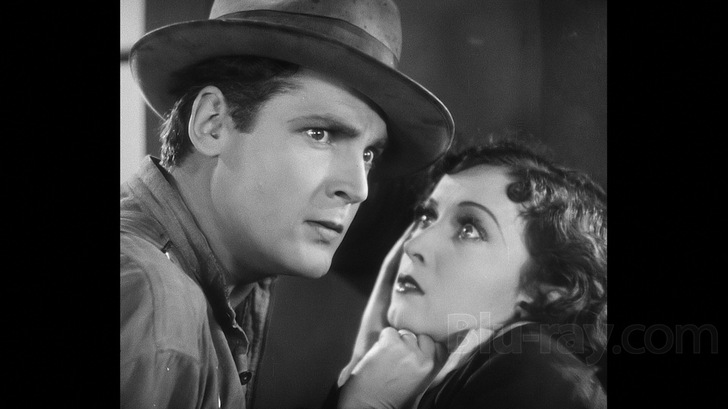
Here's what the included booklet says about the transfer:
"For this 2010 Masters of Cinema Series Blu-ray edition we encoded the HD master in 1080p AVC
format on a BD25. Heartened by Fox's U.S. release of this master without any heavy-handed
digital restoration, we decided against HD-DVNR, MTI, other forms of digital restoration, or grain
removal, after tests revealed noticeable disruption of the tonal quality belonging to the film image
in many scenes. We used the same hands-off approach with our release of Carl Theodor Dreyer's
Vampyr: The Strange Adventure of Allan Gray and F. W. Murnau's Sunrise: A Song of
Two Humans, and we feel it more respectful to the filmmakers and the patina of the image.
The level of damage still present is exactly what you would see if you were to project this same
35mm film restoration theatrically."
Put quite simply, City Girl looks brilliant on Blu-ray, and I applaud both Fox and Masters
of Cinema for their commitment to presenting this and other films in the purest form possible.
There's no trace of any unnecessary filtering or overzealous edge enhancement, and the film's
grain structure has a fine texture that's beautiful in motion. Clarity, for a film now 80 years old, is
often staggering. You can make out Charles Farrell's fingerprints as he holds his fortune; you'll
notice the knobby woolen texture of his overcoat and marvel at the crispness of blades of wheat
as they get shuffled through the thresher. The monochromatic gradation is equally vivid, with
perfectly balanced contrast and lots of depth. Blacks are deep and defining, whites are bright but
not overblown, and the gradient of gray is rich and smooth. As expected, the print isn't exactly
pristine, but the damage—which mostly consists of mild vertical scratches and occasional flurries
of white specks—is rarely, if ever, a distraction. You'll be too busy appreciating Murnau's expert
framing and evocative use of light and shadow to mind. From the architectural claustrophobia of
the city to the wide open, Days of Heaven-inspiring landscapes, the film is truly a joy to
watch in high definition, and should whet silent film fans' appetites for other influential titles set
to be released later this year.
Do note that this release of City Girl is region-free and import-friendly, as it doesn't
contain any PAL or 1080i/50-encoded data.
City Girl Blu-ray Movie, Audio Quality 
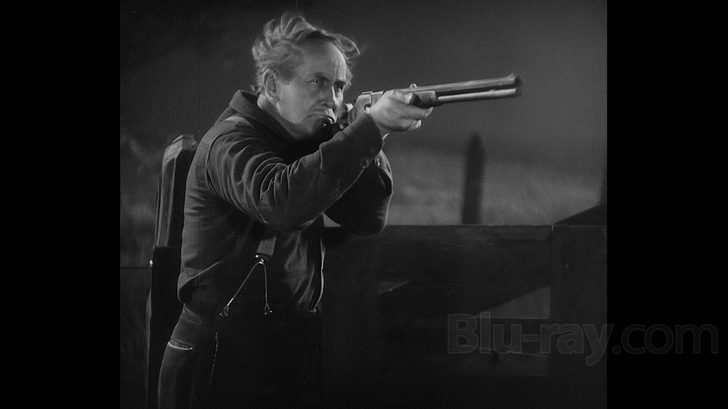
Unlike Sunrise, which survives with its original Movietone score intact, City Girl's orchestration has been lost to time. In 2008, composer Christopher Caliendo was commissioned to write and record a new score, which is presented here via a warm and detailed DTS-HD Master Audio 5.1 surround track. To be completely honest—and I'm sure many of you will feel differently— I'm not the biggest fan of Caliendo's score. It's certainly well-timed, accentuating each of the plot's dramatic moments and romantic yearnings, but it often feels too grandiose, as if it's trying to compete with, rather than compliment, City Girl's inherent emotion. The music also sounds bright and clean and new, which isn't really a fault, per se, but grafted to a weathered image from 1930, it does feel slightly anachronistic. That said, perhaps I'm being too sensitive. More objectively, and from a strictly audio-centric perspective, the score is dynamically balanced and has a fantastic sense of clarity and separation between instruments, from the crisp and breathy timbre of flutes to aching strings and briskly strummed guitars. This is a 5.1 mix, but the rear channels are really only used to fill out the sound space with reverb and ambience. Overall, the mix sounds great, but I'd love to hear something appropriately old.
City Girl Blu-ray Movie, Special Features and Extras 
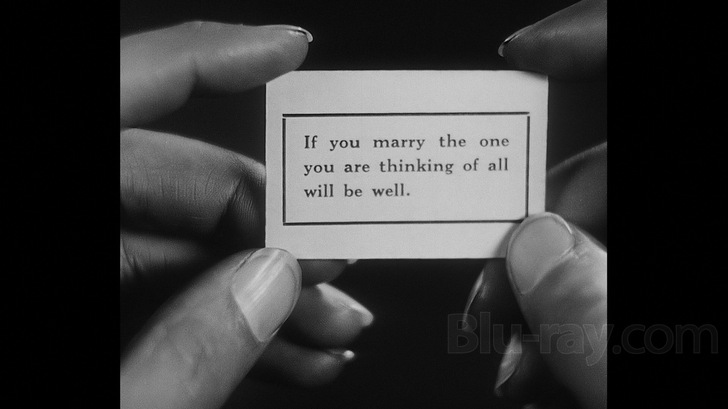
Audio Commentary by Film Historian David Kalat
Some commentaries are off-the-cuff and others meticulously prepared, and this one definitely
falls
into the latter category. David Kalat often sounds like he's reading from one of his essays—the
way
he speaks would work a lot better on the page—but he makes up for his heavily scripted tone
with a
wealth of information, most of it concerned with Murnau's increasingly troubled relationship with
Fox. There's a lot to be learned here, but Kalat sometimes seems overly enamored with his own
cleverness.
Booklet
The 28-page booklet is filled mostly with photographs, along with a brief essay by Adrian Danks
that
was originally published in Senses of Cinema.
City Girl Blu-ray Movie, Overall Score and Recommendation 
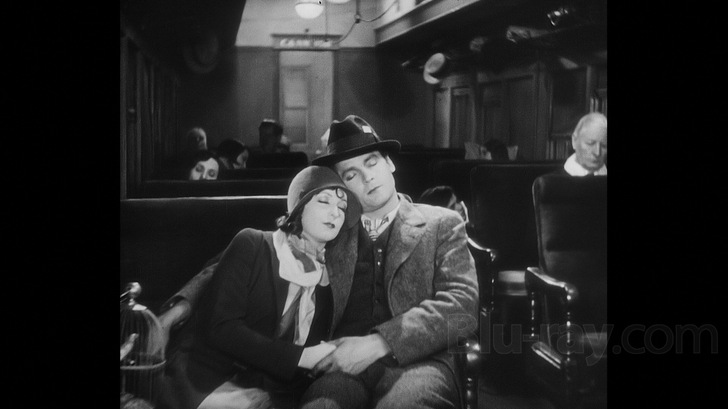
If this Masters of Cinema release of City Girl is any indication, I have a feeling 2010 is going to be a banner year for silent film cineastes. As we've seen with MOC's release of Sunrise and Kino International's release of Buster Keaton's The General, silent films have the potential to look phenomenal on Blu-ray, and this year holds promises of several Chaplin films, Metropolis, and The Battleship Potemkin, among others. If you're a fan of early cinema, don't pass up City Girl. Non-U.K. residents should also note that this title is very import-friendly. Highly recommended.
Similar titles
Similar titles you might also like

Sunrise
A Song of Two Humans / Masters of Cinema
1927

Une Femme Mariée
Suite de fragments d'un film tourné en 1964 / A Married Woman / Masters of Cinema
1964

Profound Desires of the Gods
神々の深き欲望 / Kamigami no Fukaki Yokubo / Masters of Cinema
1968

Make Way for Tomorrow
1937

Tokyo Sonata
トウキョウソナタ / Tôkyô sonata / Masters of Cinema
2008

The World
世界 / Shì jiè / Masters of Cinema
2004

Coeur Fidèle
Faithful Heart / Masters of Cinema
1923

Mad Detective
神探 / San taam | Masters of Cinema
2007

La Signora Senza Camelie
The Lady Without Camelias / Masters of Cinema
1953

Le Amiche
The Girlfriends / Masters of Cinema
1955

Tabu: A Story of the South Seas
Masters of Cinema
1931

Before Midnight
2013

Will Success Spoil Rock Hunter?
Masters of Cinema
1957

Certified Copy
Copie conforme
2010

Brief Encounter
1945

Soul Power
Masters of Cinema
2008

Certain Women
2016

A Woman of Paris
1923

Desert Hearts
1985

Accident
1967
